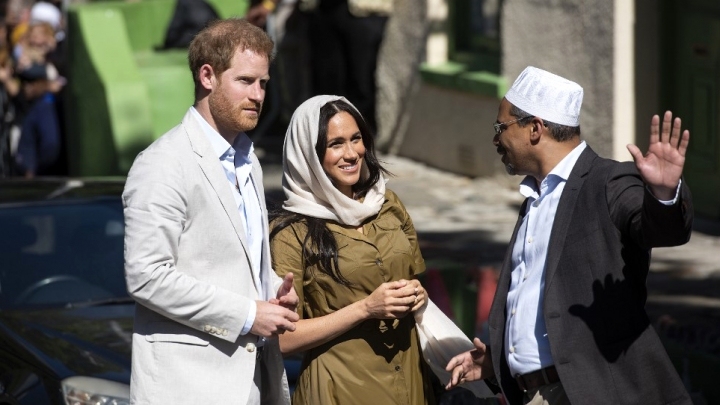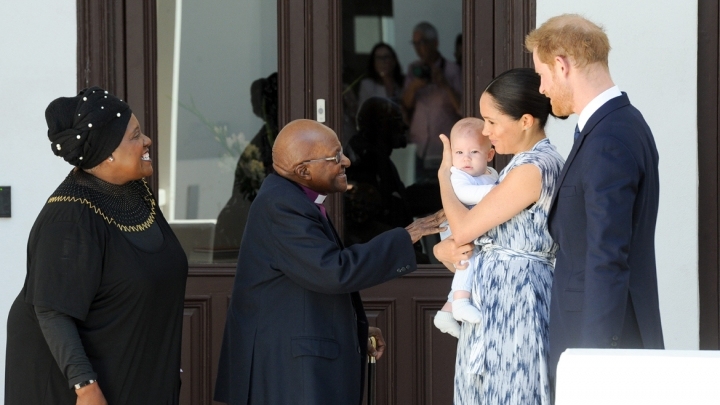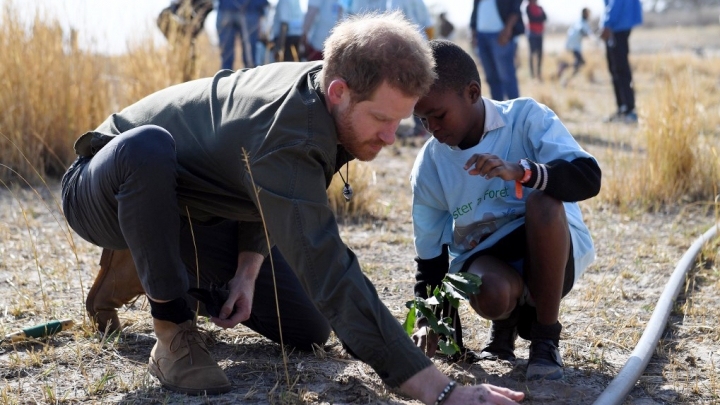'Emotional' Prince Harry treads in Diana's footsteps in Angola
Princess Diana walked across a cleared minefield near the central city of Huambo in 1997 to highlight the plight of a country that remains plagued by land mines 17 years after the end of its civil war.
Just months later Diana was killed in a car crash in Paris, when Harry was 12.
![A combination of images shows handout photos made available by the HALO Trust of Prince Harry, Duke of Sussex (R), visiting the minefield in Dirico, Angola on September 27, 2019 and his late mother Diana, Princess of Wales, during her visit to a minefield in Angola on January 15, 1997. Britain's Prince Harry on September 27, 2019 walked through a cleared minefield in Angola, tracing his late mother's footsteps to draw attention to a country that remains plagued by landmines. [Photo: AFP]](https://p3crires.cri.cn/01dcri/images/zhycms_chinaplus/20190928/b7deb89d-3ae5-4985-a902-2868e877c30a.jpg?x-oss-process=image/resize,w_650)
A combination of images shows handout photos made available by the HALO Trust of Prince Harry, Duke of Sussex (R), visiting the minefield in Dirico, Angola on September 27, 2019 and his late mother Diana, Princess of Wales, during her visit to a minefield in Angola on January 15, 1997. Britain's Prince Harry on September 27, 2019 walked through a cleared minefield in Angola, tracing his late mother's footsteps to draw attention to a country that remains plagued by landmines. [Photo: AFP]
"It has been emotional retracing my mother's steps along this street 22 years on," said Harry, standing on Huambo's now-paved Princess Diana Street.
"Being here on this transformed and bustling street... shows the tremendous impact that clearing landmines has on communities and their futures."
Diana drew attention to the more than one million landmines planted during Angola's 27-year war, which started after independence from Portugal in 1975.
"There are still more than 1,000 minefields in this beautiful country that remain to be cleared," said Harry, questioning whether "that could still be the case" if Diana were alive.
"I'm pretty sure she would have seen it through," he added.
- Elephants will return -
Earlier on Friday, Harry -- donning an almost exact replica of the protective visor and bullet-proof vest worn by his mother -- detonated a mine in Luengue-Luiana National Park, 1,000 kilometers (600 miles) south-east of Huambo.
The prince, also known as the Duke of Sussex, spent the night in the park. He called on Angolans to protect "the unique wildlife that relies on the beautiful Cuito River that I slept beside".
As a conservation advocate, he touched on ongoing efforts to encourage the return of wild animals killed by militia and landmines during the war.
"When this great wilderness rebounds and the land is regenerated," said Harry, "wildlife can and will return to Angola."
He added that elephants would "be able to naturally migrate across borders", easing pressure on neighboring countries.
Botswana -- which shares a border with Angola -- is currently struggling with a large elephant population.
![A handout photo made available by the HALO Trust shows Prince Harry (L), Duke of Sussex, visiting the minefield in Dirico, Angola on September 27, 2019. [Photo: AFP]](https://p2crires.cri.cn/01dcri/images/zhycms_chinaplus/20190928/b879339e-a118-435f-a249-056e189cd13c.jpg?x-oss-process=image/resize,w_650)
A handout photo made available by the HALO Trust shows Prince Harry (L), Duke of Sussex, visiting the minefield in Dirico, Angola on September 27, 2019. [Photo: AFP]
- Still exploding -
Later on Friday, Prince Harry visited a recently-renovated orthopedic hospital in Huambo named after his mother.
More than 1,600 people have been injured by landmines in Angola between the start of the war in 1975 and 2015, according to British charity Halo Trust.
Most casualties occurred in 2002 and 2003, when Angolans returned to their homes after peace was declared.
Diana was famously photographed meeting some of the victims during her visit.
"If an international ban on mines can be secured it means, looking far ahead, that the world may be a safer place for this generation's grandchildren," said the princess at the time.
Harry -- Diana's second son and sixth in line to the British throne -- is on a 10-day tour of southern Africa, which he started in Cape Town with his wife Meghan, the Duchess of Sussex, and four-month old son Archie.
The duchess and Archie remained in South Africa while the Duke toured conservation and HIV prevention projects around the region.
He visited Botswana before Angola, and is scheduled to fly to Malawi on Saturday.
The family will reunite in Johannesburg next week and complete the trip together before flying back on October 2.
Prince Harry last travelled to Angola in 2013 to witness the clearing of a minefield organised by the Halo Trust, which was championed by Diana.




